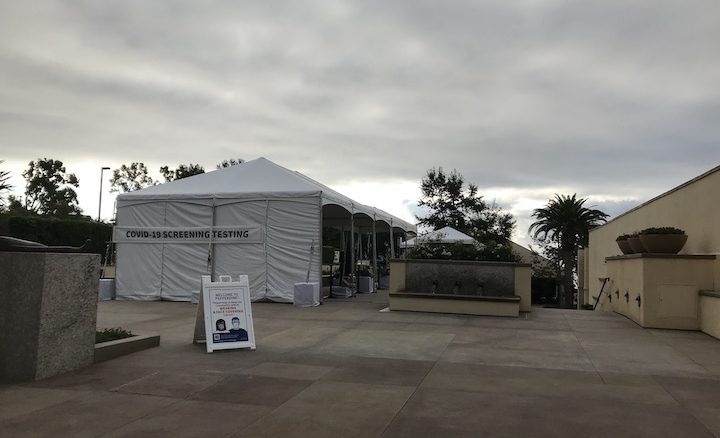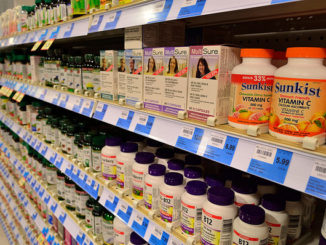
For Pepperdine first-year and sophomore students, where they are from impacts their thoughts on the university’s COVID-19 guidelines.
Malibu campus guidelines follow Los Angeles County rules and require all students, faculty and staff to wear masks indoors, regardless of vaccination status, and to get weekly screening testing for COVID-19. Students from counties that have looser guidelines were more likely to question the protocols.
“I understand [the indoor mask requirements] because we all have to be cognisant of each other,” said Parker Boutelle, a first-year business administration major from Atlanta, Georgia. “I feel like sometimes people take it a little too far, like when you’re walking through the CAC for two seconds.”
Students who are coming from certain out-of-state areas have had to learn to adjust to Pepperdine’s stricter rules involving COVID-19.
Students elaborate on masks mandates back home
Mask guidance has ebbed and flowed throughout the pandemic. Initially, after vaccinations became available to all American adults in May, Center for Disease Control and Prevention (CDC) officials announced that fully vaccinated individuals could gather indoors without wearing masks or practicing social distancing. The CDC officials changed their guidelines July 27 to recommend people wear masks indoors again, after the significantly more contagious delta variant started increasing COVID-19 cases.
“Mask requirements vary and should vary according to conditions,” Pepperdine Medical Director Dr. Lucy Larson wrote in an email. “Conditions have changed dramatically many times over the course of the pandemic, especially in regards to the amount of virus circulating in a given area, the contagiousness of the virus, and the pool of vulnerable individuals (which may vary based on vaccination rates, population demographics, and occupational risks).”
Several states started requiring masks for people indoors again in late July regardless of vaccination status, according to AARP. Many states, however, did not.
“It makes sense that different areas of the country would have different guidelines to mitigate COVID-19 infections since their risks, infection rates, primary modes of transmission, and experiences are varied and have changed in different ways over time,” Larson wrote. “However, some areas have failed to follow basic guidelines recommended by experts in public health, such as the CDC. This has been unfortunate, hindered our response to the virus, and caused confusion.”
Out-of-state students spoke about how different the COVID guidelines are in LA County compared to their hometowns.
First-year biology major Priscilla Hastings is from Nashville, Tennessee, and she said the comparison between the two areas are like night and day.
“Living in a Southern state, most people are not for masks, testing or anything like that,” Hastings said. “Gatherings were allowed very shortly after COVID, and masks were optional and not enforced at my high school.”
Hastings said it’s a lot more strict in LA, but she believes the policies help. She went to Universal Studios Hollywood one weekend, and the park required people to have a vaccination card. She said none of that happens in the South at all.
Boutelle said COVID rules in Atlanta are a lot more lenient.
“Atlanta is very wide open and there aren’t many guidelines,” Boutelle said. “If you went somewhere and forgot your mask, you were fine, but here in LA you need one.”
First-year religion major Delanie Carpenter is from a Northern state, but the COVID guidelines in Michigan are similar. Face masks are not required, according to Littler, a site that provides legal strategies and solutions for employers of all sizes.
“In Michigan, if you don’t wear masks indoors, no one is going to stop you,” Carpenter said. “Here it is more unlikely.”
Ronald Wicks, a sophomore political science major, is currently in the Washington, D.C. program. Wicks is from LA himself, and he said guidelines between the two cities are similar.
“If you want to go to most events, in both places, you need a negative COVID test, or proof of vaccination,” Wicks said. “Some indoor events have capacity limits, and some restaurants have only outdoor seating.”
Students debate indoor mask requirements and weekly COVID testing
While there are students who agree with the rules the school has set in place, some disagree.
Carpenter believes that both the indoor mask mandate and weekly COVID testing are overboard and should be left up to the individual person to decide.
“I just feel as a Christian, I’m supposed to be a peacemaker and follow the guidelines even if I don’t agree with them all the time,” Carpenter said.
Christopher Kellog, a first-year film major from Rockford, Illinois, said that at first, he found the screening testing annoying because most people are vaccinated. Kellog now realizes that finding asymptomatic cases helps reduce the spread of the virus.
“I think the mask requirements are necessary in class settings,” Kellog said. “It’s important in an area of high transmission that we all wear masks.”
Alaina Sio, a first-year sports medicine major from Chicago, Illinois, said she believes the mask requirements are keeping everyone safe. Sio likes that it’s not required outdoors, but she said it’s great students are wearing them indoors.
“The COVID testing is a nice sense of security for me because I can go home knowing I can’t spread the virus to my family,” Sio said.
Hastings also supports the Pepperdine mask policy. She said it’s extremely necessary, especially with Los Angeles currently being a hotspot for COVID.
“I’m for the weekly COVID testing as well,” Hastings said. “It keeps us from doing something crazy, and it keeps our Pepperdine bubble safe.”
Getting a positive COVID-19 test requires students to quarantine for at least 10 days regardless of vaccination status, according to UCLA SwabSeq. They are to stay in their dorm rooms and refrain from going to class.
Students discuss COVID vaccination
Experts have repeatedly said vaccines are highly effective at protecting people from serious illness, including for the delta variant. However, CDC officials said fully vaccinated people infected with delta can still spread the virus even if they themselves don’t get seriously sick.
“We are fortunate, and it is a testament to their efficacy, that the COVID-19 vaccines still work remarkably well even with different strains of the virus,” Larson wrote. “The vaccines were made with one main purpose — to decrease severe illness and death — and they are almost perfect in doing that, especially in immune competent and lower-risk individuals. They were not designed to eliminate the risk of getting infected (with mild illness) or to eliminate contagiousness in the mildly ill. This is why we continue to need other layers of protection (isolation of the infected, wearing masks indoors, etc.).”
As of Oct. 27, 87% of Pepperdine students and 92% of faculty/staff are fully vaccinated against COVID-19, according to COVID-19 university updates. Seaver College’s total vaccine rate is 86%.
Of the six students interviewed, Sio, Kellog, Hastings, and Wicks said they were vaccinated, while Carpenter and Boutelle were not.
Sio got vaccinated along with her family so they all could be with her grandfather.
“I’m glad I’m vaccinated because I’ve been in contact with people before, and I haven’t gotten COVID,” Sio said.
Carpenter, however, is not vaccinated. Since she already had COVID before, she said didn’t see a need to get the vaccine.
“I felt it wasn’t necessary for me, especially since people in our age group are less likely to have severe effects from COVID,” Carpenter said.
Larson said an individual should still get vaccinated even if they have already had COVID.
“We don’t know yet how long you are protected after you have had COVID-19,” Larson wrote. “Your protection is also greater with vaccination even after having had COVID-19 infection. Getting vaccinated will boost your immunity for better and longer protection against COVID-19, including more infectious variants of the virus.”
Larson also mentioned that while getting vaccinated is a personal choice, the choice one makes has consequences.
“Individuals need to recognize that if they choose not to get vaccinated, there are real consequences,” Larson wrote. “They will be required to quarantine after an exposure to a positive case; they may be limited in where they can go and activities they may engage in as cities, businesses, and counties begin to enact laws related to this; they may be required to have more testing; they have an increased risk of contracting the virus (about five-eight times the risk as a vaccinated individual with the same exposure); and they may be more likely to spread the virus to others causing another individual great harm or even death.”
Timothy Gay completed the reporting for this story in Jour 241 under the supervision of Dr. Christina Littlefield and Dr. Theresa de los Santos. Dr. Littlefield supervised the web version of the story.



